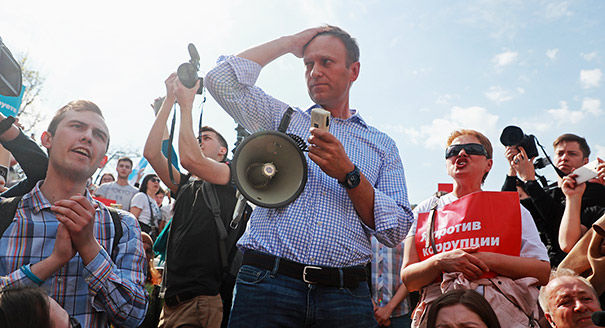As the de facto leader of Russia’s opposition, Alexei Navalny has come under sustained criticism for many things, from a failure to cooperate with fellow opposition leaders to a leadership style that detractors call authoritarian to economic populism. Yet most observers have paid little attention to Navalny’s worldview.
This omission is curious. Many Western commentators express optimism that Russia’s foreign policy will change when Putin eventually departs from politics. As it turns out, an examination of the foreign policy views of an arch-critic of and possible if unlikely successor to Putin casts doubt on that rosy forecast.
What does Navalny advocate? His positions are somewhat contradictory and driven more by domestic political considerations than by a coherent vision of the world.
To be sure, Navalny’s position strikes a contrast with the Kremlin that many in the West will welcome. He rejects the Kremlin’s narrative of a Western conspiracy to subjugate Russia. His campaign pamphlets declare: “Russia must ally first and foremost with Europe, not Iran or the DPRK [North Korea].”
Navalny favors a multilateral approach, urges compliance with all international agreements to which Russia is a signatory, and stresses the importance of the UN, an institution that he once lambasted as “hav[ing] ceased to be a place where serious decisions are made.” But he takes these positions within the framework of a “multi-vector” foreign policy of cooperation with East and West “on a mutually beneficial basis.”
Domestic concerns, and in particular the notion that Russia’s military interventions abroad are unsustainable, appear to be key drivers of his foreign policy outlook. During the presidential campaign, he defined Russia’s sovereignty as the country’s “economic viability.” According to Navalny, the main question Russia’s leaders must pose when making foreign policy decisions is, “Will our people become wealthier as a result?”
Navalny has won approval in the West for repeatedly endorsing economic sanctions against Russia’s current leadership from 2014 to 2018. But his nearly single-minded focus on Russia’s economic interests begs the question of how patient Navalny would be with the sectoral sanctions imposed on Russia by the United States and the EU should he ever succeed Putin. Thanks to what Navalny describes as the “inertia” of the U.S. “foreign policy machine,” it took Congress forty years to repeal the Jackson-Vanik Amendment.
The belief that Russia’s money is being wasted overseas is also a key reason why Navalny criticizes his government’s relationships with authoritarian allies. In August 2017, Navalny compared Russia’s financial assistance to Venezuela to “stealing money [from Russians] only to destroy it,” and complained that aid “always disappears” into the coffers of governments that “never maintain a pro-Russian political orientation.”
Navalny finds Russia’s intervention in Syria objectionable for similar reasons. He has said that the “geopolitical gains” associated with Moscow’s support for Damascus are “limited to the pages of Pravda.” Better to invest state resources in the pension fund, Navalny argued in the wake of U.S.-led air strikes against Syria’s government in April 2018.
For Navalny, it seems that the main problem with supporting the likes of Nicolas Maduro and Bashar al-Assad is material, not moral. Although he has derisively referred to Assad’s government as a “military junta” multiple times, its main crime in his eyes appears to be spending precious taxpayer rubles.
The same domestic calculations evidently underlie Navalny’s ambivalent stance on Putin’s policies toward Russia’s “near abroad” and especially Ukraine. While acknowledging that Russia’s annexation of Crimea in 2014 violated international law, Navalny has only gone so far as to call for a second popular referendum on the peninsula’s status, as have failed presidential candidates Ksenia Sobchak and Grigory Yavlinsky. On eastern Ukraine, Navalny promises to fulfill Russia’s obligations under the Minsk accords. In a controversial debate with former separatist commander Igor Girkin, Navalny described the war in eastern Ukraine as “an expensive thing.”
And yet a decade ago, Navalny had no objections—moral or material—about military intervention in the post-Soviet space. In 2008, he supported Russia’s conflict with Georgia, explicitly calling on Russia to recognize and militarily support Abkhazia and South Ossetia, blockade and sever relations with Georgia, and expel Georgian citizens from Russia. Almost a decade later, he affirmed his support for the independence of Abkhazia and South Ossetia and even voiced his support for the recognition of Transdniestria, the breakaway province of Moldova whose independence even Moscow has declined to recognize.
Navalny thus shares the establishment view that Russia is entitled to a say in the domestic affairs of its post-Soviet neighbors. He remains committed to regional integration in the post-Soviet space, advocating the expansion of the Eurasian Economic Union and the establishment of a regional trade network with Russia at its center. He believes in capitalizing on Russia’s soft power assets to influence the political calculations of its neighbors instead of spending taxpayer rubles on “petty bribery and coaxing post-Soviet elites.”
The most intrusive elements of Navalny’s “near abroad” policy are couched in pro-democracy rhetoric. He promises to export a “democratic political system,” “civil rights and human rights,” and “economic openness and free trade” to post-Soviet countries, a policy certain to disquiet authoritarian states in Russia’s neighborhood. If Putin’s Russia categorically opposes regime change—one of the main qualities that makes Russia an appealing partner for regional and international strongmen—Navalny’s Russia would compound the regime security concerns of authoritarian states in the post-Soviet space. Navalny’s “near abroad” policy would also pose a difficult question for Western observers: is Russia’s interference in the domestic affairs of its neighbors only objectionable when it promotes authoritarian norms?
Will Navalny succeed Putin? Almost definitely not. Could post-Putin political elites seeking economic growth and a less inhospitable external environment co-opt his foreign policy views? That is much more plausible. The change and continuity Navalny promises should serve as a warning to Russia’s foreign allies and adversaries alike: prepare for a post-Putin foreign policy, for better and worse.





